Find Help
More Items From Ergsy search
-

Shoulder subacromial shoulder pain
Relevance: 100%
-

Shoulder pain | NHS
Relevance: 96%
-

Shoulder pain | NHS
Relevance: 96%
-

Shoulder pain | NHS
Relevance: 86%
-

Frozen Shoulder Anterior Shoulder Stretch
Relevance: 74%
-
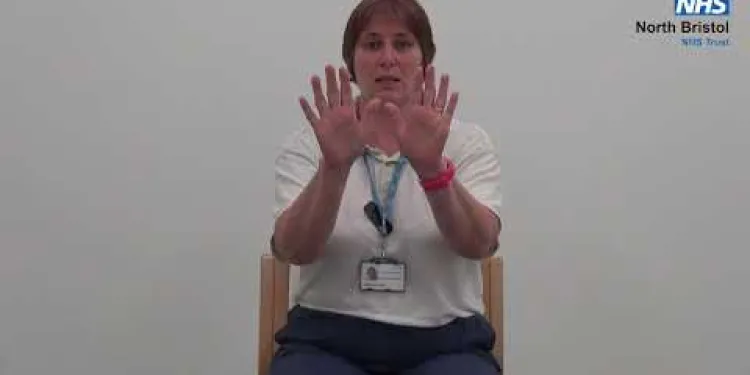
Shoulder Exercises 1
Relevance: 66%
-

Frozen Shoulder Assisted Abduction
Relevance: 66%
-
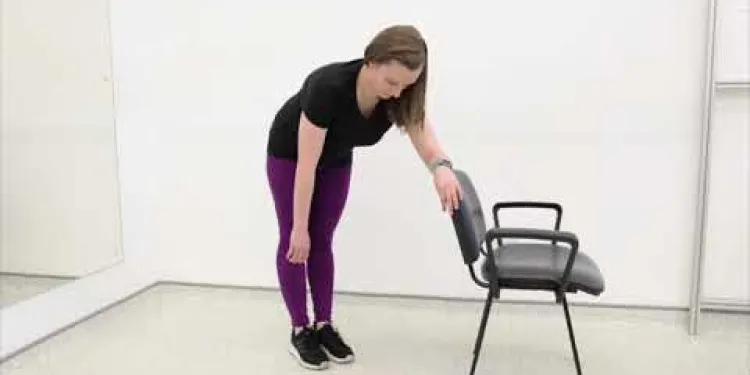
Frozen shoulder Pendular Exercises
Relevance: 66%
-

Frozen Shoulder Scapular Setting
Relevance: 65%
-
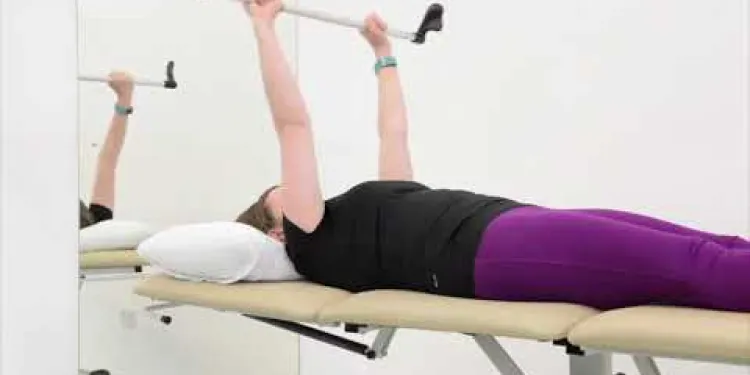
Frozen Shoulder Assisted Flexion
Relevance: 65%
-
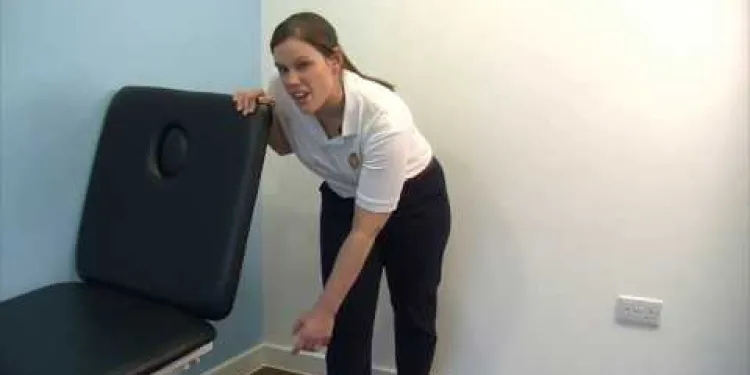
DBTH VFC DISLOCATED SHOULDER
Relevance: 65%
-

Frozen Shoulder Lateral Rotation
Relevance: 65%
-
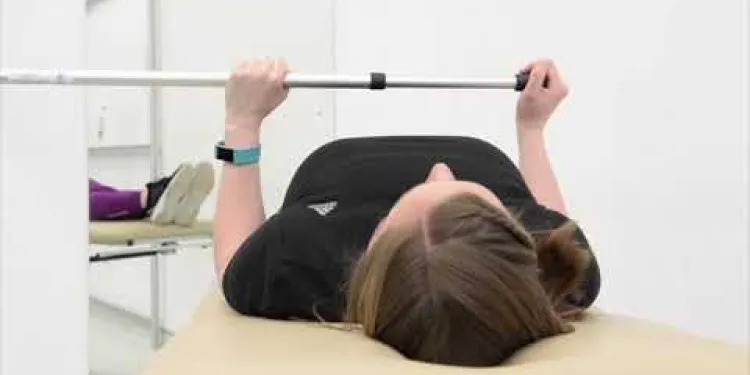
Frozen Shoulder Assisted Lateral Rotation
Relevance: 64%
-

Frozen Shoulder Isometric External Rotation
Relevance: 63%
-

Advice on neck pain and whiplash
Relevance: 47%
-

How do chiropractors treat back pain?
Relevance: 39%
-
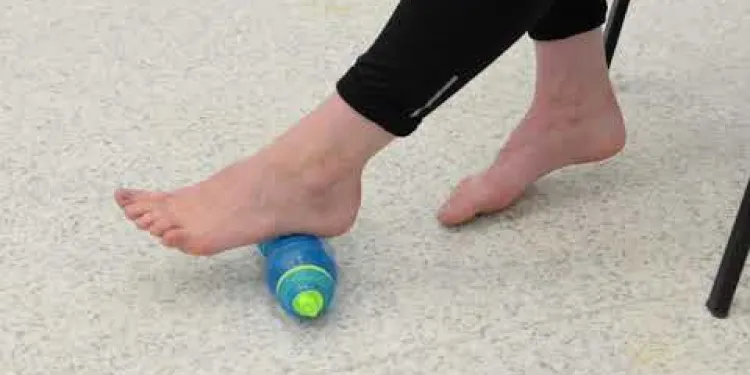
Foot Pain
Relevance: 37%
-

Is impetigo painful?
Relevance: 37%
-

Is a facelift painful?
Relevance: 37%
-

Is a mammogram painful?
Relevance: 37%
-

Heel pain | NHS
Relevance: 35%
-
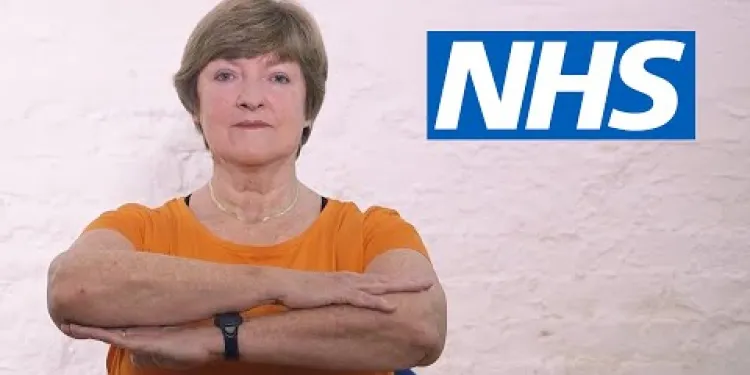
Pilates for back pain: Seated waist twist | NHS
Relevance: 34%
-
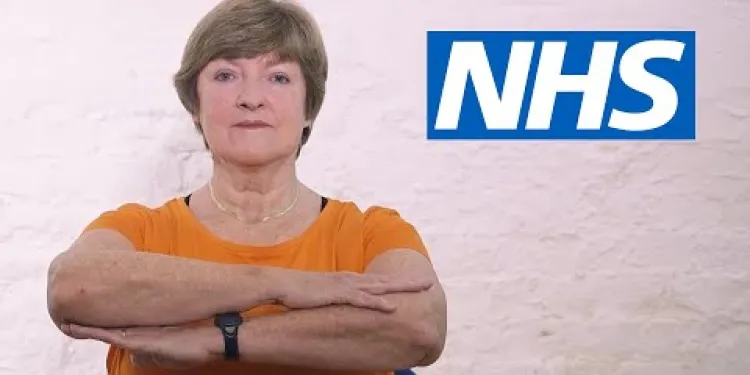
Pilates for back pain: Seated waist twist | NHS
Relevance: 34%
-

Are chiropractic treatments painful?
Relevance: 34%
-

What is the role of pain management in treating whiplash?
Relevance: 34%
-

Mechanical Lower Back Pain
Relevance: 33%
-

Will I feel pain during the procedure?
Relevance: 33%
-

Stomach ache and abdominal pain
Relevance: 33%
-

Period pain (dysmenorrhoea) - BSL
Relevance: 33%
-

Is the womb lining test painful?
Relevance: 32%
-

How to treat back pain | NHS
Relevance: 32%
-

How to deal with period pain | NHS
Relevance: 32%
-

How to deal with period pain | NHS
Relevance: 32%
-

How to deal with period pain | NHS
Relevance: 32%
-

Is a womb lining test painful?
Relevance: 32%
-

How to deal with period pain | NHS
Relevance: 32%
-

Greater trochanteric pain syndrome
Relevance: 31%
-

Can I use Ibuprofen for menstrual pain?
Relevance: 31%
-

How do NSAIDs work to reduce pain?
Relevance: 30%
-

MSK Lower Back Pain information video
Relevance: 30%
Shoulder Pain | NHS
Understanding Shoulder Pain
Shoulder pain is a common issue that can arise from various conditions. It can often impair your daily activities and impact your quality of life. The shoulder's complex structure, involving bones, muscles, tendons, and ligaments, means that pain can originate from several sources, including injuries, overuse, or underlying health conditions. Knowing the potential causes and appropriate treatments can help you manage and mitigate shoulder pain effectively.
Common Causes of Shoulder Pain
The common causes of shoulder pain can range from minor injuries to more serious conditions. Some key causes include:
- Rotator Cuff Injuries: These injuries involve the tendons and muscles that support shoulder movement. Common issues include tendinitis and tears.
- Frozen Shoulder: Also known as adhesive capsulitis, this condition leads to stiffness and pain in the shoulder joint.
- Arthritis: Osteoarthritis and rheumatoid arthritis can affect the shoulder joint, leading to pain and limited mobility.
- Dislocation: This happens when the upper arm bone pops out of the shoulder socket, often causing immediate and severe pain.
- Bursitis: Inflammation of the bursae, small fluid-filled sacs that cushion the shoulder joint, can lead to pain and discomfort.
When to See a GP
It's important to know when to seek professional medical advice for shoulder pain. You should see a GP if:
- The pain persists for more than a few weeks despite home treatment.
- You experience severe pain or sudden shoulder swelling.
- You have difficulty moving your arm or shoulder.
- The pain is accompanied by other symptoms like fever or significant bruising.
A GP may refer you to a specialist, such as a physiotherapist or an orthopedic surgeon, for further evaluation and management.
Treatment Options
Treatment for shoulder pain depends on the underlying cause. Some common treatments include:
- Physical Therapy: Exercises and stretches can help improve shoulder strength and flexibility.
- Medication: Over-the-counter pain relievers like paracetamol or ibuprofen can reduce pain and inflammation.
- Injections: Corticosteroid injections can provide relief for inflammatory conditions.
- Surgery: In severe cases, surgery may be necessary to repair damaged tissues or address structural issues.
Preventing Shoulder Pain
Prevention is key when it comes to shoulder pain. To reduce the risk of developing shoulder pain, consider the following tips:
- Maintain good posture, especially during activities that involve repetitive shoulder movements.
- Perform regular strength and flexibility exercises for the shoulder muscles.
- Avoid overloading the shoulders with heavy lifting or strenuous activities without proper conditioning.
- Ensure ergonomic setups at workstations to minimize strain on the shoulders.
For more information and resources on shoulder pain, visit the NHS Shoulder Pain Page on the NHS website.
Shoulder Pain | NHS
Understanding Shoulder Pain
Shoulder pain is when your shoulder hurts. Lots of things can make your shoulder hurt. Shoulder pain can make it hard to do things every day. Shoulders have bones, muscles, and tendons. These parts can get hurt, overused, or sick. Knowing why your shoulder hurts can help you make it feel better.
Common Causes of Shoulder Pain
Your shoulder can hurt for many reasons. Here are some common reasons:
- Rotator Cuff Injuries: These are problems with the muscles and tendons that help your shoulder move. They can get inflamed or torn.
- Frozen Shoulder: This means your shoulder gets very stiff and painful.
- Arthritis: This is when your shoulder joint is sore and hard to move.
- Dislocation: This is when the top of your arm bone comes out of the shoulder joint, causing strong pain right away.
- Bursitis: This is when small sacs with fluid in your shoulder get swollen and sore.
When to See a GP
You should visit a doctor if:
- Your shoulder keeps hurting for a while, even after you try to make it better at home.
- Your shoulder suddenly hurts a lot or gets very big.
- You can't move your arm or shoulder well.
- Your shoulder pain also comes with a fever or bad bruises.
A GP might send you to see another doctor like a physiotherapist or a bone specialist to help you more.
Treatment Options
How you treat shoulder pain depends on why it hurts. Here are some treatments:
- Physical Therapy: Doing exercises and stretches can make your shoulder stronger and more flexible.
- Medication: Taking tablets like paracetamol or ibuprofen can help with pain and swelling.
- Injections: Doctors can give injections in your shoulder to help with swelling.
- Surgery: Sometimes surgery is needed to fix problems inside the shoulder.
Preventing Shoulder Pain
Here are some tips to stop shoulder pain from happening:
- Stand and sit up straight when using your shoulders a lot.
- Do exercises to keep your shoulder muscles strong and flexible.
- Don't lift very heavy things or do hard work without preparing your shoulders.
- Set up your workstation so it doesn’t strain your shoulders.
For more help on shoulder pain, visit the NHS Shoulder Pain Page on the NHS website.
Frequently Asked Questions
What are the common causes of shoulder pain?
Common causes of shoulder pain include rotator cuff disorders, frozen shoulder, shoulder instability, acromioclavicular joint disorders, and referred pain from the neck or spine.
When should I see a doctor for shoulder pain?
You should see a doctor if your shoulder pain is severe, does not improve with self-care, is accompanied by swelling or redness, or if you have difficulty moving your arm.
How can I relieve shoulder pain at home?
To relieve shoulder pain at home, you can rest the shoulder, apply ice packs for 15–20 minutes several times a day, take pain relief medications like paracetamol or ibuprofen, and gently stretch the shoulder.
What is frozen shoulder?
Frozen shoulder, also known as adhesive capsulitis, is a condition where the shoulder becomes painful and stiff, leading to restricted movement. It typically develops gradually and can take months to years to fully recover.
Can shoulder pain be related to other health conditions?
Yes, shoulder pain can sometimes be a symptom of other health conditions such as gallbladder disease, liver problems, or heart conditions. It's important to consult a doctor for proper diagnosis.
What exercises can help alleviate shoulder pain?
Exercises such as shoulder stretches, pendulum exercises, and rotator cuff strengthening can help alleviate shoulder pain. It's important to perform these exercises gently and avoid any movements that cause pain.
How is shoulder pain diagnosed?
Shoulder pain is diagnosed through a combination of medical history, physical examination, and imaging tests such as X-rays, MRI, or ultrasound. A doctor may also recommend specific tests to identify the cause of the pain.
What treatments are available for shoulder pain?
Treatments for shoulder pain can include physical therapy, medications, corticosteroid injections, and in some cases, surgery. The appropriate treatment depends on the underlying cause of the pain.
Can poor posture cause shoulder pain?
Yes, poor posture can contribute to shoulder pain, particularly if it places extra strain on the shoulder muscles and joints. Maintaining good posture and ergonomic practices can help prevent shoulder pain.
Is shoulder pain common during pregnancy?
Shoulder pain can occur during pregnancy due to changes in posture, hormonal shifts, and increased physical stress on the body. Mild shoulder pain is usually not a cause for concern, but severe or persistent pain should be evaluated by a doctor.
Can stress contribute to shoulder pain?
Yes, stress can contribute to shoulder pain by causing muscle tension and tightness in the shoulder and neck areas. Managing stress through relaxation techniques and exercise can help reduce this type of pain.
How long does it take to recover from shoulder pain?
The recovery time for shoulder pain varies depending on the cause and severity of the condition. Minor injuries may improve within a few weeks, while more serious conditions like frozen shoulder can take months to years to fully recover.
Can arthritis cause shoulder pain?
Yes, arthritis, including osteoarthritis and rheumatoid arthritis, can cause shoulder pain. Arthritis can lead to joint inflammation, stiffness, and reduced range of motion in the shoulder.
What is rotator cuff tendinitis?
Rotator cuff tendinitis is inflammation of the tendons in the rotator cuff, a group of muscles and tendons that stabilize the shoulder. It can cause pain, particularly with overhead movements, and is often due to repetitive strain or injury.
Are there any lifestyle changes that can help prevent shoulder pain?
Lifestyle changes that can help prevent shoulder pain include maintaining good posture, performing regular shoulder-strengthening exercises, avoiding heavy lifting, and taking breaks to rest your shoulders if you perform repetitive tasks.
What can make your shoulder hurt?
Shoulder pain can happen for many reasons. Here are some common ones:
- Problems with the rotator cuff (these are muscles and tendons in your shoulder)
- Frozen shoulder (when your shoulder feels stuck or stiff)
- Shoulder instability (when your shoulder feels loose or weak)
- Problems with the acromioclavicular joint (a joint in your shoulder)
- Pain that comes from your neck or spine
If you have shoulder pain, you can try these things to help:
- Use ice or heat to feel better
- Do gentle exercises or stretches
- Ask a doctor or therapist for help
- Take breaks and rest your shoulder
Remember to talk to someone if your shoulder keeps hurting.
When do I need to see a doctor for shoulder pain?
If your shoulder hurts, you might need to see a doctor. Here are some times you should go:
- If the pain is very bad and won't go away.
- If your shoulder is swollen or you can't move it.
- If you feel weak or numb in your arm or hand.
- If the shoulder pain started after a fall or accident.
It can help to write down when the pain happens or what makes it worse. This way, you can tell the doctor more easily.
You should see a doctor if your shoulder hurts a lot, does not get better with rest, is swollen or red, or if you cannot move your arm easily.
How can I help my sore shoulder at home?
If your shoulder hurts, you can try these things to feel better:
- Rest: Take a break from activities that make it hurt.
- Ice: Put a cold pack on your shoulder for 15 minutes, a few times a day.
- Gentle exercises: Move your shoulder slowly and gently to keep it from getting stiff.
- Pain relief cream: You can rub special cream on to help with the pain.
If your shoulder still hurts, you might want to ask an adult or a doctor for help. They can tell you more things to try.
To help your shoulder feel better at home, you can do these things:
1. Rest your shoulder. This means not using it too much.
2. Put ice packs on your shoulder. Do this for 15 to 20 minutes, a few times a day.
3. Take medicine like paracetamol or ibuprofen to help with the pain.
4. Gently stretch your shoulder. Move it slowly and carefully.
If you need help reading, you can try using a read-aloud tool or ask someone to read it with you.
What is frozen shoulder?
A frozen shoulder makes it hard to move your shoulder. It can be stiff and painful. This happens when the shoulder gets tight and stuck.
If you find it hard to read, ask someone to read it with you. You can also draw a picture of a shoulder to help understand better.
Frozen shoulder happens when your shoulder hurts and is hard to move. This makes it difficult to lift your arm like before. It often starts slowly and takes a long time to get better, sometimes months or even years.
Can shoulder pain be linked to other health problems?
Shoulder pain might come from other health issues. Sometimes, problems in other parts of the body can make your shoulder hurt. It is a good idea to see a doctor to find out why you have shoulder pain.
If you have trouble reading, ask someone for help or use a text-to-speech tool to listen to the information.
Yes, sometimes shoulder pain can be a sign of other health problems. These might include issues with the gallbladder, liver, or heart. It is important to talk to a doctor to find out what is causing the pain.
What exercises can help with shoulder pain?
Here are some easy exercises to help your shoulder feel better:
- Arm Circles: Stand up straight and move your arm in big, slow circles. This helps your shoulder move easily.
- Shoulder Shrugs: Lift your shoulders up to your ears and then let them drop down. This can make your shoulder muscles relax.
- Wall Push-Ups: Stand in front of a wall. Put your hands on the wall and push like you’re doing a push-up. This makes your shoulder stronger.
If you find reading hard, try using these tools:
- Text-to-speech: This is a tool that reads words out loud to you.
- Large Text: Make the words bigger so they are easier to see.
Doing exercises can help if your shoulder hurts. You can do gentle stretches for your shoulders, swinging your arm like a pendulum, and making your shoulder muscles strong.
Be very gentle when you do these exercises. Stop if it hurts.
Tools like stress balls or therabands can help. Techniques like deep breathing can make you feel calm.
How do doctors find out why your shoulder hurts?
Doctors find out why your shoulder hurts by listening to how you feel, looking at your shoulder, and taking special pictures like X-rays or MRI. Sometimes, they do extra tests to see exactly what is wrong.
What can help if your shoulder hurts?
If your shoulder hurts, there are things that can help. Some things you can try are:
- Rest: Take a break and let your shoulder relax.
- Ice: Put a cold pack on your shoulder to make it feel better.
- Pain medicine: You can take medicine like ibuprofen to help with pain.
- Exercise: Doing simple exercises can make your shoulder stronger.
- See a doctor: If it still hurts, a doctor can help and tell you what to do.
These things can make your shoulder feel better over time.
Ways to help shoulder pain can include special exercises, medicine, injections, and sometimes surgery. The right way to help depends on why the shoulder hurts.
Can bad posture make your shoulder hurt?
Yes, sitting or standing in a bad way can make your shoulders hurt. This happens because it puts more pressure on your shoulder muscles and joints. If you sit or stand up straight and use good habits when sitting or working, it can help stop your shoulders from hurting.
Do many pregnant people get shoulder pain?
It is normal to feel shoulder pain when you are pregnant. Your body is changing and growing.
If you have shoulder pain, tell your doctor or nurse. They can help you feel better.
You can also try these things to help with your pain:
- Rest your shoulder and do not lift heavy things.
- Use a pillow to support your shoulder when sleeping.
- Try gentle exercises or stretches.
- Use a warm cloth or a cold pack on your shoulder.
If your pain is very bad or does not go away, talk to your doctor.
When you are going to have a baby, your shoulders might hurt. This can happen because your body is changing. Your body is getting ready for the baby, and it can cause pain. Your shoulders might hurt a little bit, and that's usually okay. But if your shoulders hurt a lot or the pain doesn't go away, you should see a doctor.
Can stress make your shoulder hurt?
Yes, stress can make your shoulders hurt. This is because stress makes your muscles tight in your shoulders and neck. Doing things to relax and get exercise can help your shoulders feel better.
How long does it take for shoulder pain to get better?
Sometimes a shoulder can hurt. This pain can get better. Let's find out how long it takes.
Everyone is different. Some people's shoulders get better in a few days. For others, it may take weeks.
It helps to rest and not use the sore shoulder too much. You can also try these things:
- Ask a grown-up to help you use an ice pack on your shoulder. It helps with pain.
- Move your shoulder a little every day. This can keep it from getting stiff.
- A doctor or nurse can tell you ways to make your shoulder better.
If your shoulder still hurts a lot after some time, it's important to see a doctor.
Getting better from shoulder pain can take different amounts of time. It depends on how bad your shoulder is hurt.
If it's a small injury, you might feel better in a few weeks. But if it's something serious like frozen shoulder, it could take months or even years to get all better.
Using heat packs or doing gentle exercises can help your shoulder feel better. You can also ask a doctor or therapist for advice.
Can arthritis make your shoulder hurt?
Yes, arthritis can make your shoulder hurt. There are different kinds of arthritis, like osteoarthritis and rheumatoid arthritis. Arthritis can make the joints in your shoulder sore and stiff. It can also make it hard to move your shoulder.
What is rotator cuff tendinitis?
Rotator cuff tendinitis is when the shoulder gets hurt. It can make the shoulder feel sore and hard to move.
If your shoulder hurts, you can try to:
- Rest your arm
- Put ice on it
- Talk to a doctor
A physiotherapist can help you. They teach special shoulder exercises.
Rotator cuff tendinitis means the tendons in your shoulder are swollen. This part of your body helps keep your shoulder steady. It can hurt, especially when you reach up high. This happens when you use your shoulder a lot or if you hurt it.
Tools that can help you: Try using ice to make it feel better. You can also rest your shoulder. Ask a doctor or therapist before trying exercises to help.
Can changing how I live stop shoulder pain?
Yes! There are things you can do to help keep your shoulders from hurting:
- Stay Active: Try to move every day. Walking or playing helps keep your shoulders strong.
- Do Stretches: Stretch your arms to keep them loose and flexible.
- Sit Up Straight: Good posture helps your shoulders feel better.
- Take Breaks: If you sit a lot, stand up and move around every hour.
- Lift Carefully: If you pick things up, do it slowly and use both hands.
Helpful Tools: You can use videos to learn exercises or stretch with a stretchy band. Ask a grown-up or a friend to help you.
Here are some ways to stop your shoulders from hurting:
- Sit and stand up straight. This is called good posture.
- Do exercises to make your shoulders strong.
- Try not to lift heavy things.
- If you do the same thing a lot, take breaks to rest your shoulders.
Useful Links
Have you found an error, or do you have a link or some information you would like to share? Please let us know using the form below.
-->
This website offers general information and is not a substitute for professional advice.
Always seek guidance from qualified professionals.
If you have any medical concerns or need urgent help, contact a healthcare professional or emergency services immediately.
Some of this content was generated with AI assistance. We’ve done our best to keep it accurate, helpful, and human-friendly.
- Ergsy carfully checks the information in the videos we provide here.
- Videos shown by Youtube after a video has completed, have NOT been reviewed by ERGSY.
- To view, click the arrow in centre of video.
- Most of the videos you find here will have subtitles and/or closed captions available.
- You may need to turn these on, and choose your preferred language.
- Go to the video you'd like to watch.
- If closed captions (CC) are available, settings will be visible on the bottom right of the video player.
- To turn on Captions, click settings .
- To turn off Captions, click settings again.
More Items From Ergsy search
-

Shoulder subacromial shoulder pain
Relevance: 100%
-

Shoulder pain | NHS
Relevance: 96%
-

Shoulder pain | NHS
Relevance: 96%
-

Shoulder pain | NHS
Relevance: 86%
-

Frozen Shoulder Anterior Shoulder Stretch
Relevance: 74%
-

Shoulder Exercises 1
Relevance: 66%
-

Frozen Shoulder Assisted Abduction
Relevance: 66%
-

Frozen shoulder Pendular Exercises
Relevance: 66%
-

Frozen Shoulder Scapular Setting
Relevance: 65%
-

Frozen Shoulder Assisted Flexion
Relevance: 65%
-

DBTH VFC DISLOCATED SHOULDER
Relevance: 65%
-

Frozen Shoulder Lateral Rotation
Relevance: 65%
-

Frozen Shoulder Assisted Lateral Rotation
Relevance: 64%
-

Frozen Shoulder Isometric External Rotation
Relevance: 63%
-

Advice on neck pain and whiplash
Relevance: 47%
-

How do chiropractors treat back pain?
Relevance: 39%
-

Foot Pain
Relevance: 37%
-

Is impetigo painful?
Relevance: 37%
-

Is a facelift painful?
Relevance: 37%
-

Is a mammogram painful?
Relevance: 37%
-

Heel pain | NHS
Relevance: 35%
-

Pilates for back pain: Seated waist twist | NHS
Relevance: 34%
-

Pilates for back pain: Seated waist twist | NHS
Relevance: 34%
-

Are chiropractic treatments painful?
Relevance: 34%
-

What is the role of pain management in treating whiplash?
Relevance: 34%
-

Mechanical Lower Back Pain
Relevance: 33%
-

Will I feel pain during the procedure?
Relevance: 33%
-

Stomach ache and abdominal pain
Relevance: 33%
-

Period pain (dysmenorrhoea) - BSL
Relevance: 33%
-

Is the womb lining test painful?
Relevance: 32%
-

How to treat back pain | NHS
Relevance: 32%
-

How to deal with period pain | NHS
Relevance: 32%
-

How to deal with period pain | NHS
Relevance: 32%
-

How to deal with period pain | NHS
Relevance: 32%
-

Is a womb lining test painful?
Relevance: 32%
-

How to deal with period pain | NHS
Relevance: 32%
-

Greater trochanteric pain syndrome
Relevance: 31%
-

Can I use Ibuprofen for menstrual pain?
Relevance: 31%
-

How do NSAIDs work to reduce pain?
Relevance: 30%
-

MSK Lower Back Pain information video
Relevance: 30%


